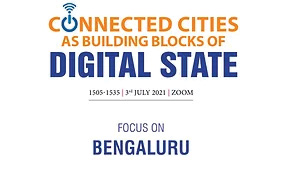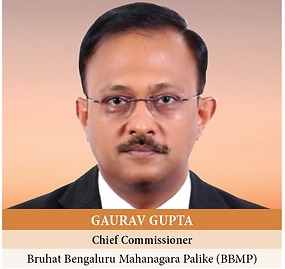CONNECTED CITIES AS BUILDING BLOCKS OF
DIGITAL STATE -
FOCUS ON BENGALURU

Our cities today are not just about infrastructure but about the delivery of citizen services efficiently and in a timely manner. Traditionally known to be responsible only for sanitation and waste management, the cities today need to add to the ease of living.
Cities have also added a lot of components to their responsibilities like urban renewal, urban expansion, technology-enabled smart and efficient infrastructure including Smart Cities and AMRUT cities. Since these are myriad components that are spread across various departments at the Centre as well as the state level, it is important to get an integrated view of urban development initiatives.
Local governments, in partnership with the State Governments and Central government, have rolled out technology-led reforms in a PPP mode. This has made citizen engagement inclusive and citizen services accessible using digital tools. Citizen feedback has assumed importance like never before. Policymakers at appropriate levels can take real-time decisions to make cities safer, prosperous, and sustainable. Monitoring of projects and performance, in addition to redressing citizen grievances, can be done in a timely manner.
Cities today are burdened with a long list of functions that pose a challenge in efficient functioning. The cities of the future need funds, functions, and functionaries that are connected with each other. Equally important are the technologies that can predict the requirements of citizens in the short as well as the long term and address the demand side. We have been studying several such interventions at the city level on a year-on-year basis and find that many of such projects are at varied levels of performance while each city has its own set of priorities and challenges. This is published annually as SKOCH State of Governance Report Card on Cities.
We would like to learn from such experiences and also document them so that others can take note of and learn from the best practices in the area. Needless to say, that you have covered a lot of ground, and our effort would be to understand these in the correct perspective so that your achievements could be documented and appropriately benchmarked.
Proposed Discussion areas:
- To what extent has the city governance become connected and its outcomes?
- To what extent has the city governance become connected and its outcomes?
- How well are citizens being able to participate and give feedback to improve city governance?
- How are cities moving from day-to-day handling of issues to more analytical and predictive governance?
- City Vision 2024.
Focus on Bengaluru
03 July 2021 | 15:05-15:35 hrs

Profile
Gaurav Gupta, IAS Batch of 1990 is the Chief Commissioner of Bruhat Bengaluru Mahanagara Palike (BBMP). He did his Master of Technology in Electrical Engineering in Power Apparatus and System of IIT Delhi and Bachelor of Technology in Electrical Engineering from IIT Kanpur. He started his administrative career as Assistant Commissioner of Kondapur Sub Division, Government of Karnataka. He has earlier served as Commissioner for Industrial Development, promoting industries and investments in state of Karnataka, and before that in various senior positions of State Government including Chairman of Bangalore Water Board, Special Commissioner in BBMP, Managing Director in KSRTC. His approach in the Government has been to facilitate trade and business. He has worked to create critical infrastructure - transport, water and electricity - for the State and also for City of Bengaluru. He has been the key driver for the ‘Invest Karnataka 2016’, the flagship mega-investment summit.
Digital State Meeting Video
| Time | Person |
|---|---|
| 15:05 - 15:20 | Mr. Gaurav Gupta, Chief Commissioner, Bruhat Bengaluru Mahanagara Palike (BBMP) |
|
15:20 - 15:35 (Disscussants) |
Discussion |
| Dr. M Ramchandran, Distinguished Fellow, SKOCH Development Foundation | |
| Mr. G B Panda, Senior Fellow, SKOCH Development Foundation and Former Senior Advisor, NITI Aayog | |
| Mr. Sujit Patheja, Director- Smart Cities & Urban Governance, SAP India |

